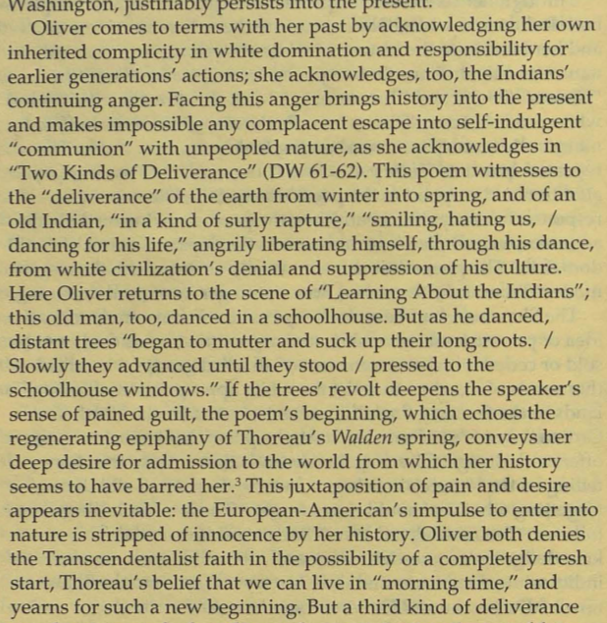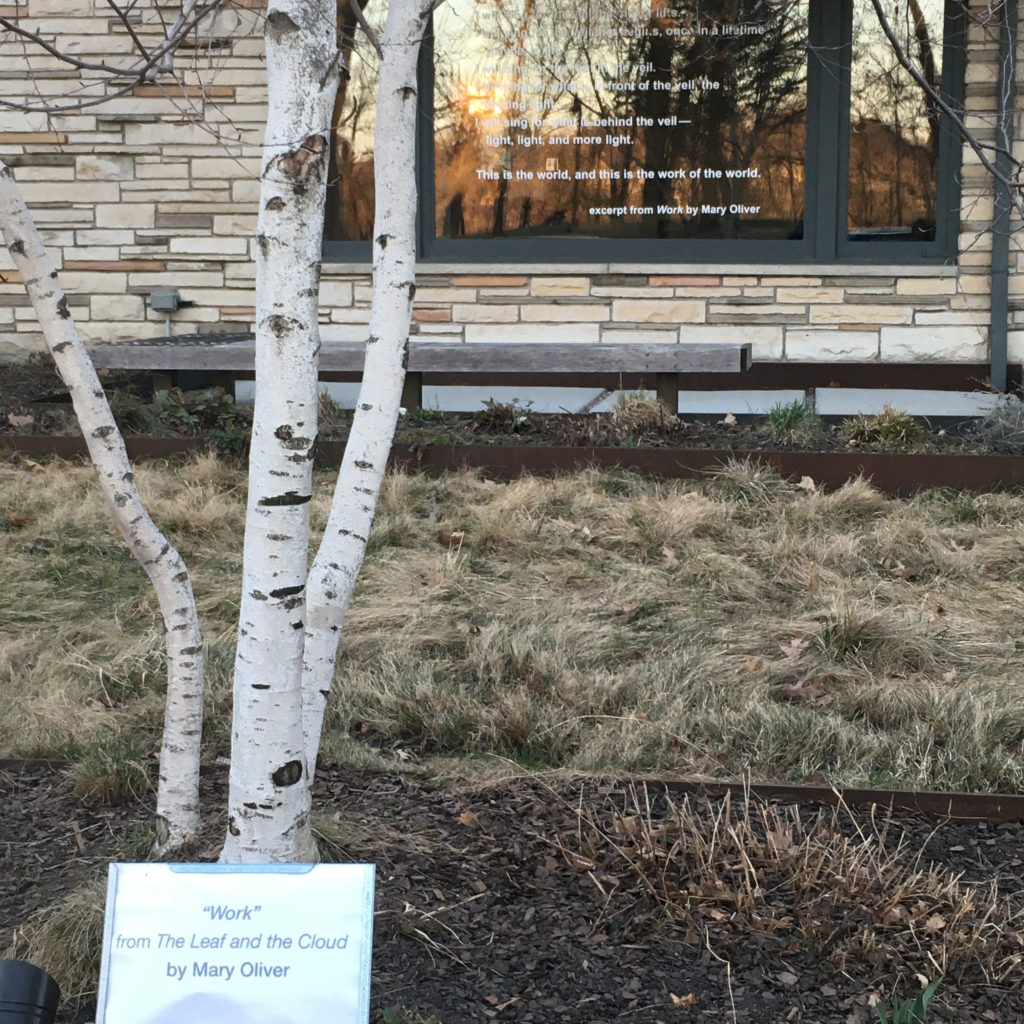3.3 miles
turkey hollow
51 degrees
Wow! Another magnificent morning in Minneapolis. Thunderstorms last night, sunshine today, thunderstorms tonight. Ran on the trail, above the river. At one of my favorite spots, just past the oak savanna, I marveled at the burning white light of the sun reflecting on the water, through the bare branches. A mile later, I thought some more about this light and remembered ED’s phrase, “white heat”–it’s part of a poem—-“Dare you see a Soul at the “White Heat”?/Then crouch within the door”—, and the name of the Darmouth blog tracking ED’s most intensely creative year: 1862.
I was able to greet Dave, the Daily Walker! I’m so happy to see that this terrible year hasn’t stopped him from doing his regular walks. When I said “Good morning Dave!” he said” “Good morning Sara! So great to see you out here again!”
Heard woodpeckers and black-capped chickadees and—I almost forgot, geese, or was it a goose? Honking as they flew over the gorge. The geese have returned for spring! This reminded me of an MO poem I read yesterday titled “Two Kinds of Deliverance.” The geese are the first kind:
1.
Last night the geese came back,
slanting fast
from the blossom of the rising moon down
to the black pond. A muskrat
swimming in the twilight saw them and hurried
to the secret lodges to tell everyone
spring had come.
And so it had.
By morning when I went out
the last of the ice had disappeared, blackbirds
sang on the shores. Every year
the geese, returning,
do this, I don’t
know how.
2.
The curtains opened and there was
an old man in a headdress of feathers,
leather leggings and a vest made
from the skin of some animal. He danced
in a kind of surly rapture, and the trees
in the fields far away
began to mutter and suck up their long roots.
Slowly they advanced until they stood
pressed to the schoolhouse windows.
3.
I don’t know
lots of things but I know this: next year
when spring
flows over the starting point I’ll think I’m going to
drown in the shimmering miles of it and then
one or two birds will fly me over
the threshold.
As for the pain
of others, of course it tries to be
abstract, but then
there flares up out of a vanished wilderness, like fire,
still blistering: the wrinkled face
of an old Chippewa
smiling, hating us,
dancing for his life.
Reading through this a first time, I wasn’t quite sure what to make of her description of the “old Chippewa,” but then I googled it, and found a helpful article: The Native American Presence in Mary Oliver’s Poetry. Here’s what the author has to say about this poem:



This discussion of the third type of deliverance–the joy of future springs combined with memory of the pain of others–makes me think of another bit of a MO poem I just read. It’s from “One of Two Things” in Dream Work:
5.
One or two things are all you need
to travel over the blue pond, over the deep
roughage of the trees and the through the stiff
flowers of lightening—some deep
memory of pleasure, some cutting
knowledge of pain.
I often think about how the land I run on, when I’m running by the gorge, was once the sacred home of Dakota and Ojibwe people. But I don’t think about it enough, and I have barely started doing the important (ongoing) work of putting that pain (which is not in the past, but still present) beside my deep love for the gorge. Maybe MO’s poems can offer a way into this work?
april 5/WALK
After 5 days of running in a row, today a break. Amazing weather! STA and I took Delia on a long (3+ mile) walk. So calm and quiet and warm! We heard a bird that sounded like a robin to me–a tin-whistle type of call–but Scott said it had black feathers with white tips, which is not how a robin dresses. Spent some time trying to find what kind of bird it was, but couldn’t. Also saw some turkeys hiding in the tall grass between Becketwood and the lower campus of Minnehaha Academy. Ah, spring!
Continuing to read Mary Oliver’s Upstream. I read some of it several years ago, and it had a big impact on me, especially her line at the end of the first chapter, “Upstream”:
Attention is the beginning of devotion.
So much so, that I wrote a sonnet about it for a poetry and form class:
Attention/ Sara Lynne Puotinen
is the beginning of devotion
devotion the beginning of prayer
prayer undertaken while in motion
gliding in and through the outside air
air offered from trees entering lungs
lungs releasing air and praying with feet
feet absorbing ground self coming undone
slowly shaking loose to a steady beat
beat river gorge rhythms almost in sync
sync stride breath oak wind sky path water time
time slowing not stopping just on the brink
of not being noticed, closely aligned
with the sweat on the surface of my skin
see hear taste smell touch acts of attention
I didn’t make it much farther past that point in the book. Why not? I don’t think I was ready. Now, reading it again, I’m finding all sorts of wonderful inspiring exciting passages that I want to use, maybe in the same way that MO hears/reads some helpful words and “quickly slips the phrase from the air and puts it into [her] pocket.” This one is going straight into my pocket:
And there is the thing that one does, the needle one plies, the work, and within that work a chance to take thoughts that are hot and formless and to place them slowly and with meticulous effort into some shapely heat-retaining form, even as the gods, or nature, or the soundless wheels of time have made forms all across the soft, curved universe–that is to say, having chosen to claim my life, I have made for myself, out of work and love, a handsome life.
Upstream/ Mary Oliver
This quote seems like a great Walt Whitman-esque declaration: Having chosen to claim my life, I have made for myself, out of work and love, a handsome life. Yes! This claiming of a life and making out of it something wonderful–generous, beautiful, sturdy, useful–is a great way to describe what I’m trying to do over on my undisciplined site with my how to be project. Because I’m so young (only almost 47), I’d say I’m making not made this life.
Here’s my MO poem for April 5th:
Softest of Mornings from Long Life/ Mary Oliver
Softest of mornings, hello.
And what will you do today, I wonder,
to my heart?
And how much honey can the heart stand, I wonder,
before it must break?
This is trivial, or nothing: a snail
climbing a trellis of leaves
and the blue trumpets of flowers.
No doubt clocks are ticking loudly
all over the world.
I don’t hear them. The snail’s pale horns
extend and wave this way and that
as her fingers-body shuffles forward, leaving behind
the silvery path of her slime.
Oh, softest of mornings, how shall I break this?
How shall I move away from the snail, and the flowers?
How shall I go on, with my introspective and ambitious life?
I love the opening question; I think I might try asking it to the morning after I greet it on some spring and summer days: “Softest of mornings, hello./And what will you do today, I wonder,/to my heart?”
Reading about the snail in the second stanza immediately reminded me of the wonderful Ars Poetica by Aracelis Girmay:
May the poems be
the little snail’s trail.
Everywhere I go,
every inch: quiet record
of the foot’s silver prayer.
I lived once.
Thank you.
I was here.
I decided to look up “snail 19th century poetry” and found 2 more snail poems to ponder:
To a Snail/ Marianne Moore
If “compression is the first grace of style,”
you have it. Contractility is a virtue
as modesty is a virtue.
It is not the acquisition of any one thing
that is able to adorn,
or the incidental quality that occurs
as a concomitant of something well said,
that we value in style,
but the principle that is hid:
in the absence of feet, “a method of conclusions”;
“a knowledge of principles,”
in the curious phenomenon of your occipital horn.
Found this poem on the UK Guardian along with a helpful analysis (and I needed it!), including this fun bit about the ending:
The line ends with a colon, and the list begins with “the absence of feet”. Critics have read this as a witty allusion to free-verse structure. Such a reading may be complicated by the fact that the snail does, indeed, possess a single foot. This is a fundamental demonstration of compression!
I think Moore is saying that “in the absence of feet” there is “a method of conclusions” (walking a line?) and that “a knowledge of principles” is exhibited “in the curious phenomenon” of the snail’s “occipital horn”. Eye-tips on the ends of tentacles are as essential for stylish poets as for cannily evolved snails. The principles invoked are acuity of vision, keenness of all kinds of judgment.
This post also links to an interesting article about snails and the eyes on their tentacles. I’m trying to read it, but it makes my brain hurt–not the ideas but the size and compression of the font. Not very accessible.
This is a very different poem from Oliver’s. Was MO thinking about this poem at all when she mentions her small snail? I don’t know. I imagine she might have been thinking a little about this final poem, by the famous Japanese poet Issa:
O snail
Climb Mount Fuji,
but slowly, slowly
In addition to the snail, I’m thinking about the clocks and a passage I just read earlier today in Upstream about the ordinary world, the attentive, social self (as opposed to the child-self and the artist-self), and the clock!
The clock! That twelve-figured moon skull, that white spider belly! How serenely the hands move with their filigree pointers, and how steadily! Twelve hours, and twelve hours, and begin again! Eat, speak, sleep, cross a street, wash a dish! The clock is still ticking. All its vistas are just so broad–are regular. (Notice that word.) Every day, twelve little bins in which to order disorderly life, and even more disorderly thought. The town’s clock cries out, and the face on every wrist hums or shines; the world keeps pace with itself. Another day is passing, a regular and ordinary day. (Notice that word also.)
